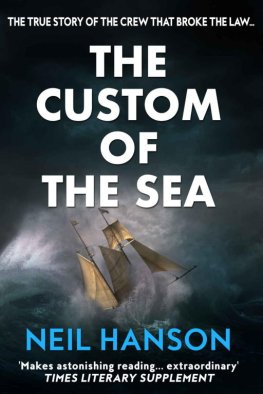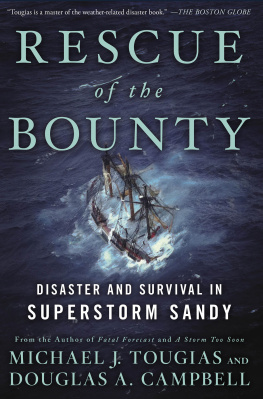Neil Hanson
THE CUSTOM OF THE SEA
The small boat was drifting in a vast expanse of empty ocean. The sun burned down from a sky the colour of brass and even the waves seemed flattened, oppressed by the heat. The oars lay idle and the faint breeze barely ruffled the makeshift sail four tattered shirts lashed together.
Three gaunt, wild-eyed men sprawled in the bottom of the dinghy. Their skeletal bodies were emaciated and covered in sores, their feet and legs swollen, their lips and tongues blackened. There was no movement but the slow rocking of the boat on the swell.
The dinghy was just thirteen feet long, four feet wide and twenty inches deep. Its thin planking was blistered by the sun and there was a jagged, splintered gash in the port gunwale. There was another hole on the waterline, roughly plugged with mildewed black cloth. Each time the hull flexed in the swell more water trickled from the hole to feed the pool covering the bottom boards.
A makeshift sea-anchor some pieces of broken timber from the wreck trailed from the boat, holding the dinghy head to wind. A torn canvas sheet, too small to offer protection from the sun, was lashed across the bow. A chronometer and sextant were stowed beneath it, but the dish-shaped metal case of the chronometer, its surface marked with dark stains, floated in the layer of scummy water in the bottom of the dinghy.
There was nothing else in the boat but two empty tins and a wooden baler. On an ocean teeming with life, the three men were slowly dying of thirst and starvation.
For over a week they had been driven stern-first by the gales, unable to turn and run before the wind for fear of being swamped. One man worked a steering oar at the stern, fighting to hold the dinghy head-to-sea, but waves broke constantly over the bows, spilling a tide of foaming water into the boat and drenching to the skin the man trying to rest, huddled in the bottom.
The other man knelt in the waist of the dinghy, dragging the baler towards him and emptying it over the side in one continuous movement. Barely keeping pace with the flow of water into the boat, he repeated the endless weary cycle a hundred, a thousand, ten thousand times. His watch over at last, he handed the baler to the next man and took his turn curled in the bottom of the boat, trying vainly to rest as sea-water cascaded over and round him, in cruel mockery of his thirst.
Their horizons shrunk by the towering seas, their world was bounded by sounds: the wind howling through the makeshift rigging, the creak of wood, the crash of waves, the swirl of water and the scrape and splash of the baler. Finally the gale began to blow itself out, the seas slackened and they slumped into an exhausted sleep.
The sun moved steadily higher in the sky and at last one of them stirred. His once-stocky figure was thin and wasted, his ribs showed through his yellowing skin and his arms and face had been burned an angry, blistered red by the sun, almost matching the colour of his hair and beard. Moving with painful slowness, he sat up, bowed his head and his cracked lips moved in a silent prayer.
After so long in the cramped confines of the dinghy, sitting, crouching or huddling on the bottom boards, none of them was able to stand upright. He peered out over the leaden sea, scanning the horizon.
Nothing. His voice was weak and hoarse, masking his Essex accent, but his grey-green eyes still showed a steely glint.
The others barely moved in response.
He sat down again on the bench and ran his finger along the gunwale, feeling each of the twenty-three notches carved in it. He took a clasp-knife from his pocket. There was a dark, sticky residue around the base of its two-inch blade.
He tested the edge with his finger, then began stropping the blade against the heel of his palm. The sound was almost hidden by the creaking of the timbers and the lapping of the swell against the boat, but the other two men were instantly alert, their eyes fixed on him as they sat up.
He leaned over the gunwale and cut another notch with four strokes of his knife, then folded it and put it away. He turned to reach under the canvas sheet and handed a small strip of dried meat to each of them. Theres little enough left, he said, his voice low and hoarse. And weve been four days without rain. If we are not all to perish
One of the men turned his head away as if ducking his captains words, but the others dark, brooding eyes held a warning. Lets not talk of that again. A ship will come.
But if one does not, or if it passes us by as the others have?
I tell you, a ship will come. He moved back to the stern and gnawed at his scrap of meat.
The captain studied him for a moment, then began chewing his own piece. It was as brown, tough and dry as old leather and, without saliva, almost impossible to swallow.
After a few moments he set it aside. Moving with painful slowness, he undid his trousers. Each touch of the coarse, salt-encrusted cloth against his skin was agony. He reached into the bottom of the boat for one of the empty tins, and after sitting motionless for several minutes, a few drops of thick yellow urine dribbled into the tin. He closed his eyes and drank it in one gulp, his face slack and expressionless, then resumed his slow chewing.
A cold north wind was blowing off the sea, over the wasteland of creeks, marshes and mudflats. Between the banks of reeds and coarse sea-grass, thin streams, shining silver in the light from the cloud-streaked sky, wriggled sinuous as eels across the brown, glistening mud.
Raised wooden walkways on timber piles threaded through the marshes, linking the berths and small jetties lining the creeks. The carcasses of a few mouldering hulks lay on the mudbanks, slowly drowning under a relentless, choking tide of silt. Cormorants perched on them, airing their wings, as herons stalked across the mud, probing with dagger beaks for frogs, eels and fish.
Tom Dudley watched the fishing smacks making their way downstream on the swirling water of the rising tide, past Shinglehead Point and out into the main channel of the Blackwater. The cries of birds filled the air and the wind carried the sour, earthy smell of the saltings to him; he could almost taste the salt tang at the back of his throat. He had learned his craft in these waters, but this was the last time he would ever sail them.
His stance as he stood at the helm of the yacht Mignonette showed his character: feet spread, broad shoulders back, meeting chest-on anything that the sea or life could throw at him. His keen eyes were as grey-green as the seas on which he had always earned his living, and his red hair and beard stood out in vivid contrast to the monochrome vista of mud, marsh and water.
The floodtide advanced across the saltings and broke against the sea wall. Part of it had been breached by the winter storms and the pounding waves had scoured away a broad section of the marsh beyond it, as if some sea-monster had risen from the deeps and bitten down into the land.
The defences were being repaired, as they had been countless times before, but all Tollesbury men knew that the sea was an implacable opponent. Whether it stole their land, their ships, their lives, by the sudden, savage assault of a single, ferocious storm, or the relentless attrition of a thousand tides and a million breaking waves, the hunger of the sea could never be assuaged.
Away to the north, at the furthest reach of the marshes, the wooden sails of a windmill creaked and rattled as they turned, pumping fresh water for the livestock from deep below ground. The grazing cattle plodded towards higher pasture, some pausing to rub themselves against the thick baulks of timber, black as bog oaks, driven into the ground. Their trampling hoofs had turned the earth around the scratching posts into a black morass.








